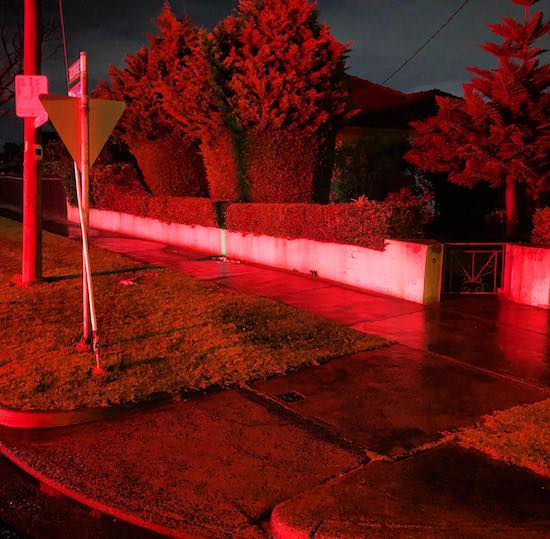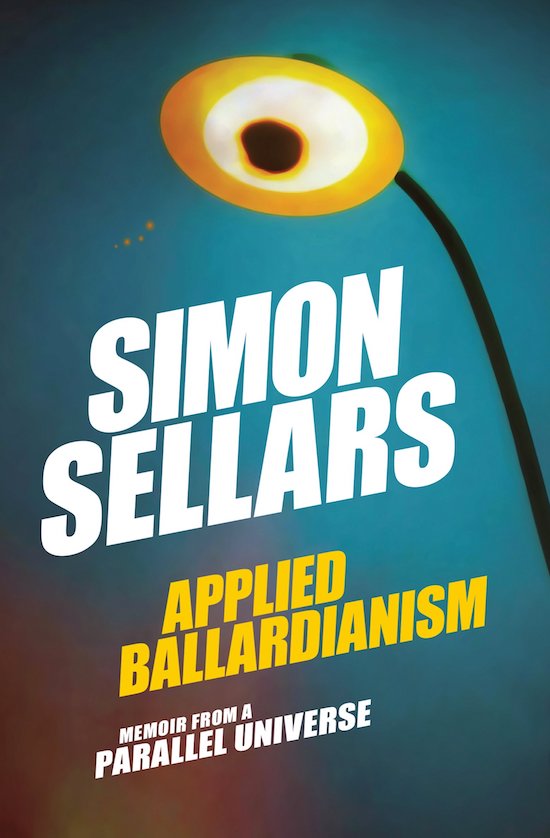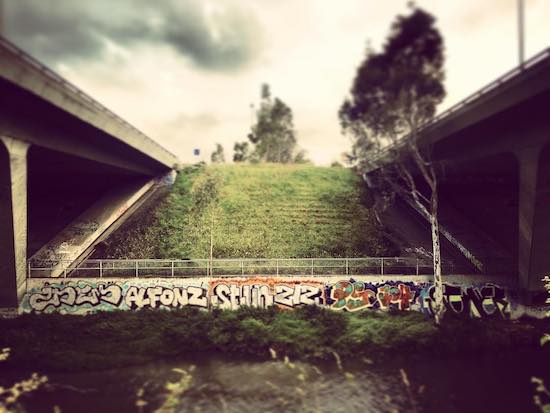The mission is important. It must be completed. Photo by Simon Sellars
One night up on Mornington Peninsula overlooking Melbourne’s Port Philip Bay, Simon Sellars saw something he couldn’t explain up in the windswept sky. Like something out of Twin Peaks, a voice – “weirdly genderless” – stole into his mind’s ear to insist, “Something will happen over there.”
And as if by magic, “Instantly, four bright orange orbs appeared int eh sky over the mountains, arranged in a quarter circle. After a few minutes, they reformed into a cross, then a square, then a triangle trailing a single orb. Periodically, they would ‘switch off’ and reappear in another part of the horizon, many kilometres away, zigzagging across the sky at impossible speeds. A group of strangers were at the lookout. They all saw the display. One woman dissolved into tears, repeating the same question over and over.
“’What is it? What is it?’”
I don’t know if this story is true or not (could it be true?). It appears quite early on in a new book called Applied Ballardianism, billed as a “memoir from a parallel universe.”. Its author, Simon Sellars, is an Australian writer, editor, and blogger, previously responsible for a book on Micronations and a long-running blog dedicated to the work of the British author JG Ballard. In this strange hybrid text he takes us from the ivory towers of European academia to the edglands of the Victorian suburbs and beyond.
It is a curious, unsettling text, full of weird obsessions and mysterious drives. Gleefully, on page after page, it tears up the conventions of literary criticism, autobiography, and fiction and spits them out the other side. Applied Ballardianism is a febrile dispath from a future already, in the words of Ballard himself, “devoured by the all-voracious present.”
When I first knew that I was going to interview Sellars, my first thought was to ask, “How much of this is actually true?” But in the end I decided that would spoil the fun.
And if Applied Ballardianism is one thing, then it is most certainly fun.

Suburbs stained by hypercapitalism. Photo by Simon Sellars
What can you tell me about the K-Pulp imprint that Applied Ballardianism falls under?
It’s an imprint for publishing so-called theory-fiction, set up by Robin Mackay at Urbanomic. Robin wants K-Pulp to publish works in which theory and fiction commingle in different ways, or need each other to function for whatever reason. Theory-fiction is what it sounds like, a hybrid form, and I guess my book falls in line with that. Applied Ballardianism is a fictionalised memoir about an insane alternate version of me and that person’s attempt to write a PhD on J.G. Ballard. Parts of the book record his internal dialogue, his pathetic attempts to analyse Ballard’s work, and that’s where the theory kicks in.
I don’t think theory-fiction is a genre, though. I certainly don’t feel part of any movement. Theory-fiction is more like an attitude or something. People don’t take theory seriously anymore. Everyone’s bored with it. Philosophy memes scorch everything in their wake. Nothing is taken seriously. The world is so chaotic that no overarching theory can ever hope to explain it. So, the form itself leaks and cracks. It becomes bent out of shape and bleeds into other genres. Theory-fiction is maybe the result of that process.
Then again, maybe it’s always been in the air. Recently on Twitter, an Australian PhD student, Gregory Marks, posted a four-page ‘Theory-Fiction Reading List’ that attracted a lot of attention. It included works by Ballard, Kafka, Borges, Sebald, Land, Bataille, Fisher, Burroughs, Eco, Blake, Barthes, Acker, Calvino, Sebald, Jarry, Negarestani and so on. Quite a diverse assemblage. The list is chronological. The first entry is ‘Lucretius – On the Nature of the Universe (55 BC)’, and the last is ‘Simon Sellars – Applied Ballardianism (2018)’. Make of that what you will.

How did you land on the book’s form, which seems equal parts sci-fi fantasy, literary criticism and confession?
The book assumed that form as a survival mechanism. I did a PhD on Ballard, graduating in 2009. Soon after, Mark Fisher asked me to adapt my thesis for Zero Books. At the time, the project was called ‘Applied Ballardianism: The Philosophy of J.G. Ballard’. It was going to be a pretty straight translation of the thesis to book form, including lofty assertions about Ballard being more a philosopher than a novelist. But when I started writing it I was so jaded with academia that I suffered crippling writer’s block. I was working as a sessional tutor at any university that would have me and it was soul destroying. At the end of each semester, I had to sign on for the dole because I always worked short-term contracts. I knew it could never lead to any kind of fulltime work, let alone a tenured position. Who would ever want to employ a cultural studies academic with a research focus on J.G. Ballard? Not only was cultural studies a dying discipline, but my work was too niche. Although I considered Ballard a philosopher, my reading of him was too low-brow for any philosophy department and too cult for any literature department.
Also, I thought I would die if I read one more academic paper that included phrases like “I want to argue that…”, which they all seem to do. The linguistic conventions were a straightjacket for people like me, who did not fit in or could not conform. The confessional aspects of my book arose from struggling with that. At the same time, the theoretical interventions in the text are the residues of that part of my life, because I still thought of myself as an academic, even if the dream of making a living from academia was dead and buried. In the end, the only way I could do justice to what I was going through was to write about my alter ego trying to write the thesis that I ended up submitting. Like my narrator, I have been guilty of taking Ballard too far, of trying to live a ‘Ballardian’ life. Many of the scenarios in the book, including much of the violence and even some of the paranormal elements, are based on situations I’ve lived through.
As for the science fictional elements, the book is what it claims to be in the subtitle: a memoir from a parallel universe. My life as a failed scholar seen from a reverse angle. The ending, which I trust we won’t reveal here, is overtly science fictional, but even so the book is supposed to illustrate Ballard’s maxim that ‘the only truly alien planet is Earth’. That is, the conditions we are living through today – haemorrhaging realities, fake news, hypercapitalism, fractured online identities – are so complex, so mercurial and so self-erasing that not even science fiction can truly capture them. All the writer can do is bear witness and record what is happening with total psychological honesty.
Why Ballard?
Ballard is the most prescient commentator on hypercapitalism, consumerism and the invasion of our bodies by personal technologies. There’s an observation of his, quoted in Applied Ballardianism, which sums up everything we’ve been talking about: ‘The most prudent and effective method of dealing with the world around us is to assume that it is a complete fiction. Conversely, the one small node of reality left to us is inside our own heads.’ I often feel like my physiology, my nervous system, has mutated through over exposure to new technology, especially social media. Only Ballard – and maybe Cronenberg – has accurately recorded the process.

Greetings from your banal dystopia, where cracks in time and space sprout like weeds in the pavement. Photo by Simon Sellars
Is ‘Ballardianism’ a conceptual tool that we might apply to any and every situation? Is there, for instance, a Ballardian analysis of the Trump presidency? Or the current Turkish financial crisis?
I’m sure there are Ballardian analyses available of the cultural currents you mention, but don’t ask me to supply them. You should take my narrator seriously when he says he has been defeated by Ballard. The book closes that part of my life. Sort of like giving up religion, I’ve given up Ballard. I’ve said all I can say about him and his work, for over 20 years now. I wrote my first academic paper on Ballard in 1994. In 1996 I started my PhD on him, which I abandoned and returned to a decade later. I’ve managed the website Ballardian for almost 15 years. I published the book Extreme Metaphors: Interviews with J.G. Ballard 1967–2008. Even so, it’s only now in 2018, almost 25 years on from that first paper, that I can truly say I’ve arrived at an interpretation of Ballard that makes sense: there is no interpretation.
That’s why the narrator of my book is damned. His scholarly analysis is all for nothing, because Ballard, the nature of his work, is true slipstream. The work resists all conclusions. No one has nailed it. Ballard has been claimed by left and right activists, even by libertarians. They can’t all be on the money, can they? When he stopped writing science fiction, the fanboys refused to let him go, even as he insisted that his work wasn’t science fiction but a commentary on exactly what’s happening today. He said Crash, his most extreme work, was more autobiographical than Empire of the Sun, which many people still consider his memoir. I have in mind a sequel to Applied Ballardianism, but Ballard will not feature. If he is a ghost in Applied Ballardianism, then in the sequel he will be a state of mind, so saturated into the fabric of everyday life that his name will not need to be invoked.
As for ‘Ballardianism’, no one should look to that as a conceptual tool for making sense of the world, unless they’re tired of living. In my book, ‘Applied Ballardianism’ – that is, the theoretical framework devised by the narrator – is a severe misreading of Ballard’s work. All it does is give the narrator licence to indulge his most violent impulses, including a deep suicidal strain. Through immersion in Ballard’s work, through over analysing its dystopian elements, he comes to believe that Ballard has taught him to accelerate a suburban apocalypse so that everything can be destroyed and he can begin again amid the ruins.
Applied Ballardianism almost kills him. That’s the point.
Applied Ballardianism by Simon Sellars is published by Urbanomic


